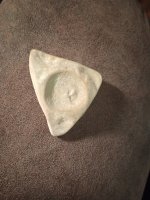Lucky13
Full Member
A little bit about myself and what im trying to accomplish first off.My name is John and im a scout troop leader here in southwest virginia,Recently the Boy Scouts of America have started getting involved in the geocache adventures offered by state parks using GPS,Our older eagle scout groups are doing legitimate cache hunting and artifact recovery throughout virginia as well. We were issued a permit to metal detect in jefferson national forest this past summer and some of the coins recovered were just absolutely amazing,once i saw them with my own two eyes i immediately became hooked on the idea of metal detecting,prospecting,and cache hunting as a full time personal hobby.Ive read alot of the posts here on the forum about ways to research cache hunting sites as well as attending some hunts organized by groups within buchanan county where i currently reside. Ive met alot of friendly ppl and have recieved some great advice on treasure hunting and recovery,But with fall here and the onset of winter rapidly approaching i have a few questions for some of you veteran MDers out there.
I recently recieved permission to search around some old houses that were bought by a mining company in the early fortys along US Route 460,These homes have been empty for seventy years that im aware of.Some probably longer than that. The problem is that they are over grown with a vine called Kutzu(not sure if thats spelled correctly).The kutzu literally covers the entire house sides and roof through the spring and summer months and dies out in the fall and winter,But even when the leaves on the vines are dead,the vine its self remains about four inches thick on the top of the ground. Would i still be able to detect this area in the fall without first moving the vines and still get a decent signal with my metal detector?
My next question is,does the ground being wet or frozen ultimately effect metal detecting in the winter months? The main reason for waiting until winter is because of snakes,These vines are perfect habitat for rattlesnakes and copperheads in the summer months. These are probably common sense questions for most veteran guys out there but i just started this hobby in june of this year,even with the mass amount of metal detecting advice online,There isnt alot of discussion about the good/bad effects of metal detecting in different ground conditions throughout changing seasons. I will try to add some pictures of the area i plan to hunt after this weekend when im up that way. Any Advice you can give on metal detecting in the winter months or advice on detecting in areas with alot of underbrush will be greatly appreciated and if in the future i can help you with a question about something or give you information on an area im familiar with,Id be more than happy to oblige you.
Thanks again and HH.
John
I recently recieved permission to search around some old houses that were bought by a mining company in the early fortys along US Route 460,These homes have been empty for seventy years that im aware of.Some probably longer than that. The problem is that they are over grown with a vine called Kutzu(not sure if thats spelled correctly).The kutzu literally covers the entire house sides and roof through the spring and summer months and dies out in the fall and winter,But even when the leaves on the vines are dead,the vine its self remains about four inches thick on the top of the ground. Would i still be able to detect this area in the fall without first moving the vines and still get a decent signal with my metal detector?
My next question is,does the ground being wet or frozen ultimately effect metal detecting in the winter months? The main reason for waiting until winter is because of snakes,These vines are perfect habitat for rattlesnakes and copperheads in the summer months. These are probably common sense questions for most veteran guys out there but i just started this hobby in june of this year,even with the mass amount of metal detecting advice online,There isnt alot of discussion about the good/bad effects of metal detecting in different ground conditions throughout changing seasons. I will try to add some pictures of the area i plan to hunt after this weekend when im up that way. Any Advice you can give on metal detecting in the winter months or advice on detecting in areas with alot of underbrush will be greatly appreciated and if in the future i can help you with a question about something or give you information on an area im familiar with,Id be more than happy to oblige you.
Thanks again and HH.
John



